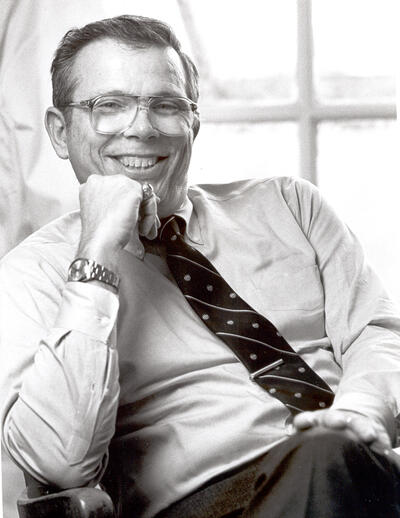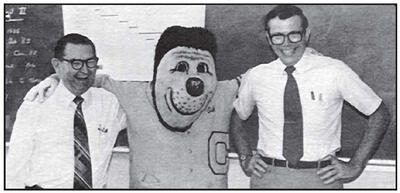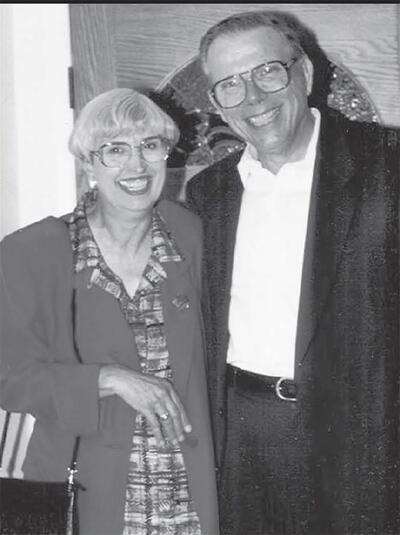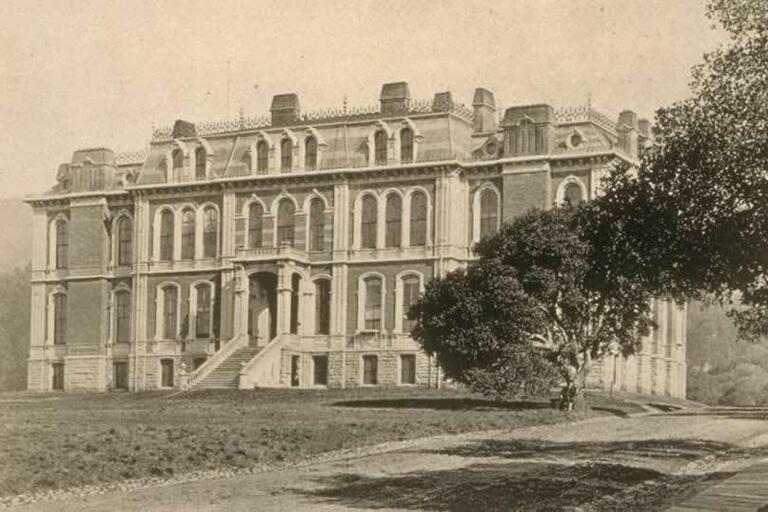This article was first published in Chemical Engineering Education, Vol. 39 No. 3, Summer 2005 (p178-182); © 2005 American Society for Engineering Education. It is reprinted here by permission of the publisher.

In the middle of the UC Berkeley campus, next to the Main Library, South Hall is the last surviving building from the original campus, founded about 135 years ago. A tiny tree-shaded appendix to this venerated classical building houses Berkeley’s Center for Studies in Higher Education, directed by C. Judson King, former Provost and Senior Vice President – Academic Affairs of the ten-campus University of California and long-time Professor of Chemical Engineering at Berkeley.
Jud came to Berkeley in 1963 as assistant professor of chemical engineering, following receipt of a doctor’s degree from MIT and a subsequent short appointment as director of the MIT chemical engineering practice school station at what was then Esso (now Exxon) in New Jersey. His undergraduate degree is from Yale.
Starting with his MIT doctoral dissertation on gas absorption, Jud has devoted much of his professional career to separation processes. His teaching and research activities have been primarily concerned with separation of mixtures with emphasis on liquid-liquid extraction and drying. As a consultant to Procter and Gamble, he contributed to the technology of making instant coffee. His life-long activities in hiking and camping stimulated Jud’s interest in the manufacture of freeze-dried foods (e.g. turkey meat) to minimize the weight of his hiking back-pack.
Jud is internationally known not only for his many research publications but even more, for his acclaimed textbook “Separation Processes” (McGraw-Hill, second edition 1980) that is used in standard chemical engineering courses in the US and abroad.
Born of an army family in Ft. Monmouth, New Jersey in 1934, Jud moved about in the military world during his early years. He developed an interest in camping and mountaineering during that time, an avocation he has retained throughout his life. After high-school in Alexandria (Virginia), Yale and MIT, and after marriage to Jeanne (1957), Jud began his career at Berkeley in 1963.
While the concept of unit operations in chemical engineering is about 90 years old, when Jud started his professional career at Berkeley, about 40 years ago, the standard separation operations (distillation, extraction, absorption, etc) were considered to be separate topics, each described by its own methodology. Through his research and teaching, and above all, through his influential textbook, Jud showed that each of these separation operations is a special case of a unified technology that can be described by a general set of quantitative principles. Jud’s book not only emphasizes the common aspects of various forms of separation technology; Jud also discusses convergence methods for computerized calculations, energy requirements, and rational criteria first, for selecting an optimum separation method for a particular purpose and second, for an optimized series of separation steps in an industrial chemical plant.

Jud with John Prausnitz in May 2004 after receiving Berkeley-Citation diplomas.
Jud’s pioneering leadership in advancing the technology of separation processes is also indicated by the Separations Division of AIChE; Jud was the co-founder of that Division 15 years ago.
A major part of Jud’s research work has been concerned with freeze-drying, in particular, freeze-drying of foods, notably beverages such as coffee. A key problem in freeze-drying is to retain the volatile flavors while subliming ice. Further, it is extremely important to avoid collapse of the porous structure that results from sublimation; failure to prevent collapse makes it impossible to reconstitute the dried product by adding water. Similarly, for biological agents, collapse may cause the loss of biological activity. Jud and coworkers showed that collapse can be avoided by careful control of viscosity and by addition of suitable additives (excipients). In addition to foods, this work has also been of much help to guide freeze-drying of pharmaceuticals. In 1971, Jud published a book “Freeze Drying of Foods” (CRC Press).
A second research area concerned extraction of carboxylic acids for recovery from dilute aqueous solutions. Such extraction is important not only for acetic acid but more recently, for lactic acid that is used for making bio-degradable polylactic acid. Jud and coworkers investigated the technology and economics of using suitable complexing agents (e.g. amines) in suitable “inert” water-insoluble solvents. His research showed convincingly that the “inert” solvent plays a major role; in fact, it is not inert.
A third area of Jud’s research has been directed at synthesis in plant design. Following the strong influence of the book “Transport Phenomena” by Bird, Stewart and Lightfoot (published in 1960), chemical engineering research in the universities was primarily directed at analysis, at detailed microscopic descriptions of chemical and physical processes. During the 20-year period starting about 1965, Jud was one of the few academics who gave attention to the logic of plant design, to establishing rational criteria and methods that can make plant design more of a science than an art.
A popular and highly effective teacher, Jud supervised a large number of MS and PhD theses. Table 1 gives the names and present affiliation of his former PhD students.

Within a few years following his arrival in Berkeley in 1963, it became clear that in addition to his fine abilities in teaching and research, Jud has truly extraordinary talents in administration. He was appointed vice-chair of the Chemical Engineering Dept. in 1967 and became chair in 1972 for nine years. During that time, Berkeley’s Chemical Engineering Department grew remarkably in size and stature. Since Jud’s chairmanship, the National Research Council has consistently rated the Berkeley ChE Dept within the top three in the United States.
In 1981, Jud became Dean of Berkeley’s College of Chemistry, comprising two departments: Chemistry and Chemical Engineering. Because the numbers of faculty and graduate students in Chemistry are about 3 times those in Chemical Engineering, Berkeley’s world-famous Chemistry Department has traditionally been the dominant part of the College. Jud was the first chemical engineer to become dean, a remarkable achievement because, all too often, academic chemists are reluctant to accept chemical engineers as equals. Because of his open fairness and because of his consistent good judgment, Jud was able to break the chemists’ prejudice. In a sense, the election of Chemical Engineer Jud King in 1981 as Dean of the College of Chemistry is analogous to the election of Catholic John Kennedy in 1960 as President of the United States.
Jud’s creative chemical engineering research was much stimulated by extensive consulting contacts with a variety of industries, shown in Table 2.

Jud (right) launching the Tan Hall Project in 1983, shown here with Project manager Herb Fusfeld and Oski.
During his deanship, Jud led a successful effort to build Tan Hall, a major building (completed in 1997) for research laboratories in synthetic chemistry and chemical engineering, including biotechnology. In 1982, Jud established a College of Chemistry Development Office for obtaining much-needed financial support from alumni and corporations. While such offices are now ubiquitous, twenty-three years ago, it was a pioneering step to have such an office in a specific college in a state-supported institution. Jud correctly anticipated that in California (as elsewhere), state support for the university would seriously decline despite ever-increasing costs.
During his deanship, Jud started a new annual tradition. Every spring, the dean invites all College staff members to lunch for celebrating “Staff Appreciation Day”. At this lunch, also attended by many faculty, the dean warmly thanks all staff for their devoted service that is essential to the College’s operation. He also recognizes individual staff members for outstanding service or for many years of service.
During six successful years as dean, the top Berkeley administration noticed Jud’s outstanding administrative abilities. As a result, in 1987, Jud was appointed Berkeley’s Provost for Professional Schools and Colleges (Engineering, Law, Business, Chemistry, Social Welfare, Environmental Design, Natural Resources, Education, Optometry, Public Health, Public Policy, Journalism, Library and Information Studies (now Info Mgt & Systems), a position directly under the Berkeley Chancellor. One of his major tasks was to help define the role of agriculture on the Berkeley campus and to modernize agricultural sciences.
In 1994, the President of the University of California chose Jud to serve as Vice Provost for Research; in 1996, the President selected Jud to be his right-hand man as Provost and Senior Vice President for Academic Affairs for the entire University, including Berkeley, UCLA, UC Davis, UC Santa Barbara, and six more. In addition to many other duties, Jud had responsibility of programmatic oversight for the Dept. of Energy National Laboratories at Berkeley, Livermore and Los Alamos.
As the University’s Provost, Jud had many diplomatic challenges, including relations with the University’s often volatile Board of Regents concerning affirmative action with respect to student admissions and recruiting of faculty and staff. Further, it was his task to provide academic planning for how the University can accommodate an expanding population of college-bound Californians in the face of decreasing financial resources. Anyone who reads the newspapers can appreciate the complexities of California politics.
Because the President of the University is much occupied with the University Regents, the Governor and the State legislature in Sacramento, the Federal government in Washington, with alumni, industrialists, labor unions, etc. etc., it was Jud who had “to mind the store”, to take care of the university’s daily operations. Jud retired from this awesome administrative position in 2004.
Jud’s remarkable administrative skills follow from his smiling, soft-spoken manner and from his uncompromising, conscientious sense of fairness, responsibility and punctuality. Shortly after his arrival in Berkeley, these skills became evident to his colleagues who admired Jud’s calm efficiency in organizing his classes and research program. About one year after his arrival, following an insightful and concise presentation Jud made at a Chemical Engineering Department faculty meeting, a senior professor in the department remarked: “This fellow is amazing. He could run General Motors.”
With students, colleagues, secretaries, carpenters or CEOs of major corporations, in short, with anyone, Jud has a gift for attentive listening. His role as administrator is to be helpful rather than obstructive. His decisions are always well-considered; they are clear, unambiguous and expressed with gracious diplomatic sensitivity. Everyone may not agree with a particular decision but it is always received with respect and without rancor. Jud’s firmness is always accompanied with a friendly twinkle, often enhanced by light humor. No one ever gets angry with Jud. Nor does he ever show any anger: always calm and considerate, he never raises his voice. At heated faculty meetings it would be instructive to put a pH meter in his stomach to determine his real feelings.

Jud and Jeanne King have three (now grown) children: Mary Elizabeth, Cary and Catherine. Since 1969, Jud and Jeanne have lived high in the Kensington hills, in a house overlooking Tilden Park.
Jud and Jeanne are enthusiastic hikers all over California, especially in the Sierra Nevada Mountains where they have a summer residence in Mammoth Lakes and on the coast, between Jenner and Mendocino, where they have a weekend home in The Sea Ranch near Gualala.
For many years, Jud was active in Boy Scouts, serving as Scoutmaster of a local Boy Scout Troop. He has led dozens of overnight hikes for his scouts in the mountains, canyons, and parks of California. When asked if he ever had disciplinary problems with his boys, Jud replied, “No, the boys are no trouble. But sometimes I have problems with accompanying dads.” A perennial problem of such hikes is to avoid poison oak. Following unintended exposure to poison oak, Jud recommends soaking 15 minutes in a full bathtub with one cup of Clorox added to the bath water.
Now, as director of Berkeley’s Center for Studies in Higher Education, Jud is using his extensive university experience first, to identify some major problems facing higher education in California (and elsewhere) and second, to stimulate research toward solving such problems. Topics that reflect his particular concerns include the university’s role in maintaining and promoting innovative technology; methods for sustaining a large research-oriented university in the face of perennial financial shortages; and the role of new technology to advance and facilitate scholarly communication.
Jud’s distinguished career as a chemical engineering educator has blossomed towards concerns with higher education in general. For the last 20 years and even more now, Jud’s work is directed toward contributing to answer a key question: today and tomorrow, what is the proper function of a university in the world, in the US, in California? While many academics are working on this question, Jud is particularly well-qualified to do so not only because of his long experience in university administration, but also because of his chemical engineering background that favors versatility, tolerance for new ideas,
goal-orientation and a faith that good science can lead to useful results.
In engineering and in public service, Jud enjoys a stellar reputation. Whenever President Bush needs to replace a member of his administration, Jud King would be an excellent candidate.
Update: In 2020, Jud published a history of the department of Chemical and Biomolecular Engineering at Cal.

